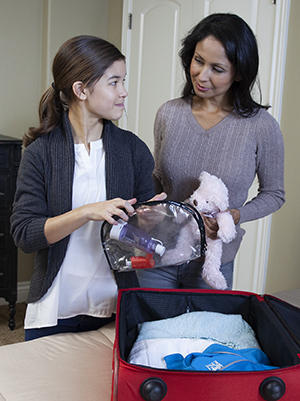Your Child's Asthma: Away from Home
Your child will likely spend time at the homes of family and friends, at daycare, or at school. There are things you can do to make it easier for your child and for their caregivers. Review the suggestions below. Also talk with your child's healthcare provider about how to keep your child safe and healthy.

At school
Arrange a meeting with your child’s teachers, school nurse, and other staff members. At this meeting:
-
Make sure you have an up-to-date copy of your child's Asthma Action Plan. If you don't have one, call your child's healthcare provider. Provide copies of your child's plan. Go over the plan at the meeting.
-
Discuss the medicines that you will send to school for your child. Make sure the staff knows how to help your child use their inhaler or take other medicines.
-
Discuss possible triggers. Include class pets, mold, cleaning products, tobacco smoke, and other scented products (for example, perfumes or lotions). If colds or the flu trigger asthma, make sure staff watches for early signs. They may include a stuffy or runny nose, sneezing, and complaints of a sore throat.
-
Be sure the school staff knows what to do if your child's symptoms start to get worse. They must also know what to do if your child has an asthma attack. Refer to your child's action plan.
-
Give the school phone numbers for both you and your child’s healthcare provider. These are needed in case of an emergency. Include this information on your child's action plan.
-
Make sure you understand the school's policies about self-treatment and keeping inhalers with your child.
Other people’s care
To help keep your child healthy:
-
Be sure that anyone who takes care of your child has a copy of their Asthma Action Plan —and understands how to use it. Make sure they understand your child's medicines—the dose, frequency, and how and when to give each one.
-
Make sure anyone caring for your child can contact you or your child's healthcare provider.
-
Before your child visits a new friend, talk with the friend's family. Explain your child’s asthma and ask about triggers in the household. This is especially important before an overnight visit.
-
Just like at school, make sure that anyone watching your child knows what to do if symptoms start to get worse. They should also know what to do if your child has an asthma attack.
-
Encourage your child to play with friends at your home or another safe place if their asthma is triggered at a friend’s house.
-
Make sure your child is not around smokers in the homes or cars of family or friends, or in other places.
Online Medical Reviewer:
Amy Finke RN BSN
Online Medical Reviewer:
Deborah Pedersen MD
Online Medical Reviewer:
Jessica Gotwals BSN MPH
Date Last Reviewed:
10/1/2022
© 2000-2024 The StayWell Company, LLC. All rights reserved. This information is not intended as a substitute for professional medical care. Always follow your healthcare professional's instructions.